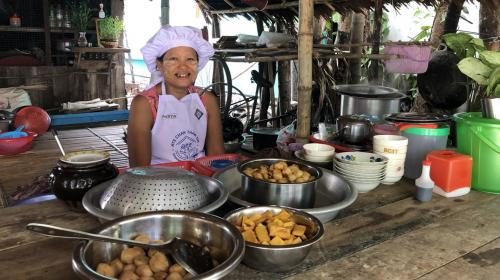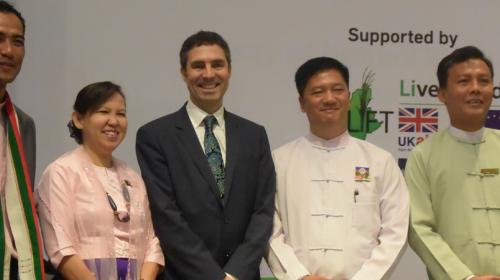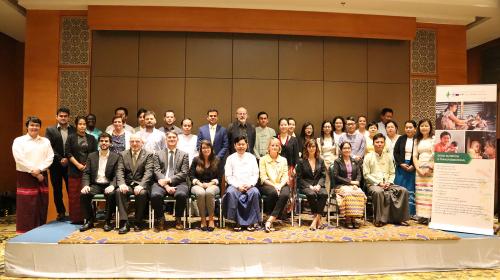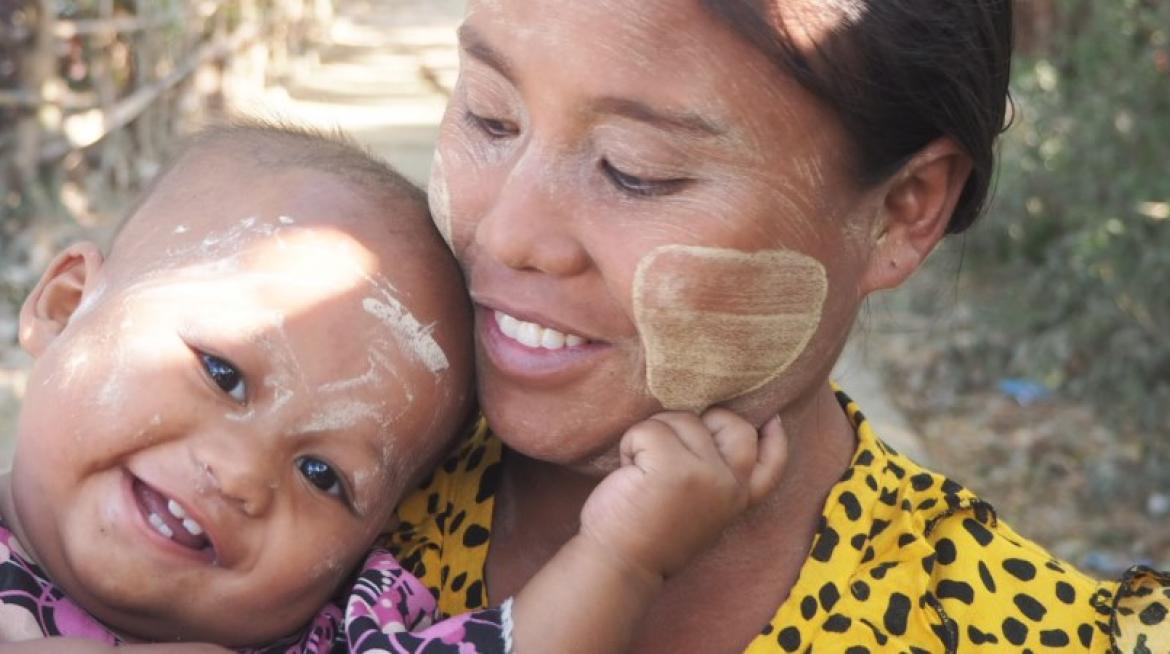
LIFT and partner organisations met with regional government representatives for a coordination workshop on nutrition on 7 November, 2017 in the Ayeyarwady Delta region in south-west Myanmar. This was the first time LIFT and its regional nutrition implementing partners met with Ayeyarwady government representatives from three different ministries to discuss collaborative approaches to nutrition outcomes. LIFT considers interministerial coordination essential for effecting good nutrition outcomes in Myanmar. By bringing together representatives from the Ayeyarwady Ministries of Social Welfare and Relief Resettlement; Health and Sports; and Agriculture, Natural Resources and Environmental Conservation, workshop attendees had the opportunity to inform each other about nutrition-related projects, discuss common goals and challenges, and find opportunities for collaboration. The event was also attended by government representatives from the three LIFT target area townships of Labutta, Bogale and Mawlamyinegyun. LIFT partners included Save the Children, LEARN, Welthungehilfe, GRET, PATH and World Vision.
LIFT has been working in the Ayeyarwaddy Delta region since 2009 in the aftermath of Cyclone Nargis. Although much of the region’s agricultural potential has been restored since the cyclone, the regional poverty rate remains high, and malnutrition is a significant challenge. LIFT views nutrition as a multi-sectoral matter of concern, involving not only the health sector, but also education, social welfare, and agriculture. LIFT has been supporting nutrition-sensitive and nutrition-specific interventions in Ayeyarwady focusing on the first 1000 days’ of a child’s life.
The Ayeyarwady region has many diverse and nutrient-rich foods. LIFT programmes are working to teach communities the importance of good nutrition, preventing wasting and stunting in early childhood. Photo: John Rae.
According to the Ayeyarwady Regional Government’s Department of Health, 38 per cent of children under five are underweight, and 7.8 per cent of children suffer from wasting, which describes children who are significantly underweight. Malnutrition in the first 1,000 days of a child’s life – that is, from inception to the second birthday – can have irreversible effects. Children who are stunted, meaning they are below average height for their age due to malnutrition and repeated bouts of illness, are likely to have impaired brain development, and are at greater risk of disease. This affects their ability to perform well at school and secure jobs, impacting their economic potential.
The workshop was facilitated by nutrition experts from the countrywide, LIFT-funded, Leveraging Essential Nutrition Actions to Reduce Malnutrition (LEARN) project.
Opening Remarks
Ayeyarwady Minister of Agriculture, Natural Resources and Environmental Conservation, U Ba Hein, gave opening remarks. He spoke warmly about LIFT nutrition projects underway in the region saying, “In future, with these projects, many people can make decisions of their own and change their daily habits, like hygiene habits and daily activities.” U Ba Hein has worked closely with the LIFT Ayeyarwady Delta programme team for many years. “I will be supporting you in the long run,” he said.
Minister U Ba Hein addresses attendees including government representatives from the three LIFT target area townships of Labutta, Bogale and Mawlamyinegyun and LIFT partners Save the Children, LEARN, Welthungehilfe, GRET, PATH and World Vision.
Libera Antelmi Dazio, Livelihoods and Food Security Specialist coordinating LIFT’s Delta programme, highlighted some of the region’s most pressing nutrition challenges. “Data from the recent Demographic and Health Survey of MOHS, 2015-16, shows that 35 per cent of children under 5 are stunted, which is high and well above the national average of 29 per cent,” she said. “The diets of infants 6-11 months of age in the Delta Zone are extremely poor; almost no children in this age group have an adequately diverse diet and prevalence of diarrhoea is 15 per cent.” To tackle these nutrition concerns, Ms Antelmi Dazio said that closer government collaboration across ministries was an important key to success.
Agriculture Minister U Ba Hein discusses nutrition with LIFT Livelihoods and Food Security Specialist Ms Libera Antelmi Dazio.
Nutrition in the Delta
Six LIFT-funded partner organisations, as well as the Nutrition Taskforce from the Ayeyarwady Department of Health, presented on their nutrition projects in the region. The purpose of these presentations was for government and LIFT partners to inform each other about their activities, and discuss the achievements and challenges of their projects.
Daw Htay Htay Min, one of five members of the DoH Nutrition Taskforce, spoke about government nutrition policies. “With locally-assigned midwives and volunteers, we measure monthly the weight of children under five years’ old. Those that are found to be underweight or stunted are referred to the nearest clinic or hospital,” she said. “We provide vitamins and proteins to pregnant mothers and children as well: particularly iron, vitamin A and vitamin B. We have managed to almost eradicate vitamin A deficiency.”
However, there are challenges for the Department of Health. Recruiting and retaining village-level volunteers is difficult. Many find other job opportunities, so the turnover rate is high. The lack of human resources within the department is another challenge.
Brett Ballard, LIFT Policy Specialist spoke about the importance of government in achieving nutrition outcomes. “LIFT’s role is to pilot and identify lessons in order to help support government to scale up nutrition investment,” he said. “Government is the key to sustainable programming.”
Nutrition expert, U Saw Eden, then presented the Leveraging Essential Nutrition Actions to Reduce Malnutrition (LEARN) project, which is tackling malnutrition through education and social behaviour change programmes all over Myanmar. LEARN has been assisting LIFT partners, government agencies and other NGOs active in Ayeyarwady to build sustainable and effective social behaviour change programmes for nutrition outcomes. This includes crucial nutrition behaviours such as encouraging women to breastfeed children exclusively until six months of age, reversing restrictive food taboos that prevent mothers and children from enjoying diverse and nutritious local food, and teaching healthy complimentary feeding practices that help children grow and develop.
LIFT-Funded Projects in Ayeyarwady
The workshop provided an opportunity for LIFT partners to present about their projects, their achievements and challenges, to government representatives and each other.
1. Supporting mothers and infants in the first 1000 days’ window
In Labutta Township, Save the Children is implementing LIFT’s Maternal Child Cash Transfer programme, called the Building Resilience and Synergy and Unity for Nutrition (Bright SUN) project. Mothers who are pregnant or have children up to the age of two years (i.e. in the first 1000 days’ window) are given monthly cash payments of 15, 000 MMK along with nutrition awareness and social behaviour change training. The purpose of this programme is to improve child nutrition, to reduce stunting and wasting in the first 1,000 days. The programme covers 200 villages, and five rural health centres.
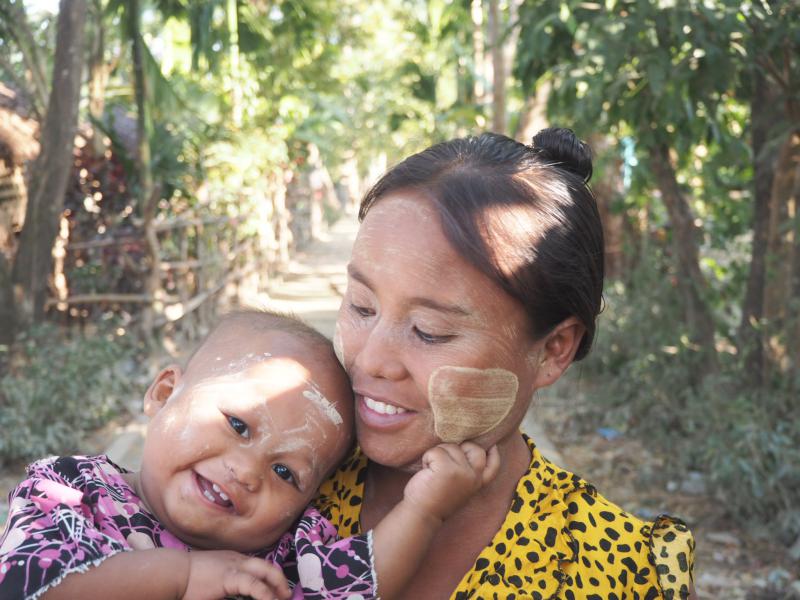
Over 5000 women in Labutta have been receiving monthly payments, enabling them to buy nutritious foods for their children and themselves.
Over 5,000 women have been receiving direct payments. In 32 villages, Bright SUN has been using mobile WAVE money in an innovative approach to making transfers to beneficiaries. The project has run over 1,300 social behaviour change training modules for midwives, rural health centre workers and volunteers, and has facilitated the formation of 200 Mother-to-Mother support groups.
2. Tackling micronutrient deficiencies with fortified rice
Workshop participants learn about fortified rice from PATH’s Dr. Phyo Win Htun.
Funded by LIFT, PATH has adapted its innovative fortified rice-making technologies to produce for the local Myanmar market. Working with 6 FDA-approved rice millers from Yangon, Ayeyawady and Bago, fortified rice is now available in two different varieties common in Myanmar: Ehmata and Pawsan. Fortified with iron, zinc, folic acid, vitamin A, thiamine and other B vitamins, this rice is now being distributed by the Department of Social Welfare to 51 nursery schools in Ayeyarwady, Yangon, Bago Region and Nay Pyi Taw for school lunches. This is a major step towards overcoming nutrient deficiencies in children. The rice is also commercially available through supermarkets, and market sellers. By August 2017, over 275 metric tonnes of rice had been either sold or distributed in Myanmar since the programme began.
To make the fortified rice, grains are formed with technology adapted from pasta-making, using rice flour that has been combined with nutritional supplements. These grains are mixed into regular rice at a ratio of 1:100. The taste is indistinguishable from regular rice, as determined by extensive taste-testing conducted by PATH. Research on fortified rice programmes in Brazil shows that regularly eating fortified rice significantly reduces rates of iron and vitamin B anaemia, as well as improving general health and energy levels. This rice is also being included in hospitals, and is being distributed by the World Food Programme to beneficiaries in Myanmar. PATH is looking to continue expanding rice production and increasing consumption in Ayeyarwady, as well as other areas in the country.
3. Other LIFT-funded nutrition projects in Ayeyarwady
Welthungerhilfe and GRET are implementing a project, Delta RISE, to support farmers increase incomes and diversify through new seed production, improved nutrition and WASH outcomes, and provide capacity-building training. The WHH/GRET consortium is working in Bogale and Mawlamyinegyun Townships, with an extension into Pyapon Township from June 2017. They have conducted module training on nutrition to over 3,500 households, and have distributed seeds seven times (as seasons require) to 1,467 households.
World Vision Myanmar is also working with LIFT in Ayeyarwady, implementing the LIFT-funded Growing Livelihoods in Bogale project. It is working to increase rural household incomes and resilience in 30 villages in Bogale township. It seeks to bring about nutrition outcomes with community groups and volunteers.
Mr. S’ Sein Shwe from World Vision is currently the chair of the Delta regional Scaling Up Nutrition Civil Society Alliance. Although Myanmar has an active SUN CSA on a national level, Ayeyarwady Delta is the only area with a region-specific SUN CSA. Currently, 17 national and international NGOs hold membership. The Delta SUN CSA, which was established in the last quarter of 2016, is continuing to develop. It aims to foster dialogue and collaboration between civil society groups working in nutrition.

